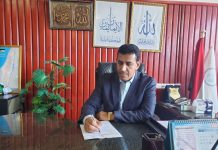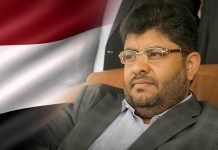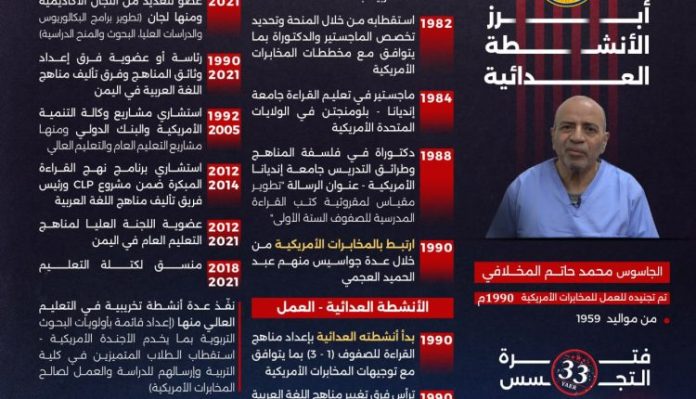The American-Israeli espionage network has revealed new details about American conspiracies targeting Yemen across various sectors, particularly focusing on education.
- Brief Overview of Dr. Mohammad Hatim Al-Mukhlafi:
- He was sent to the United States, where he earned his Master’s and Ph.D. degrees in Language Education from Indiana University.
- 1989: Appointed Head of the Computer Unit.
- 1991: Became Head of the English Department at the College of Education, University of Sana’a.
- 1992: Promoted to Vice Dean of the same college.
- 1993: Became Dean of the College of Education in Al-Nadira, Ibb Governorate.
- 1996: Appointed Dean of the College of Education in Hajja.
- 1997: Served as Technical Advisor for the Basic Education Project.
- 2000: Became Dean of the College of Education in Khawlan, Sana’a Governorate.
Key Confessions of Spy Mohammad Al-Mukhlafi:
I was nominated for a scholarship to the US and arrangements were made for me to study language at Yale Institute. My specialty was Arabic, and I wondered how I could study Arabic in the US However, I was convinced that linguistic science in America was advanced and that I would benefit from combining both languages.
A meeting was arranged for me with David Ost. I traveled with a group of individuals from higher education institutions who had studied their Master’s degrees in the U.S., but our program was different. Upon arrival, we were met by an AMIDEAST representative.
I obtained my Master’s degree in two years and began my doctoral program. My thesis topic was about developing a scale to measure the readability of primary school reading books in Yemen.
Within the ministry and the training and rehabilitation sector, several staff members were sent for training programs lasting one or two years. They returned to Sana’a and played a significant role in the ministry’s activities and programs.
In 1990, I was informed about a meeting for agency scholarship students at the American Embassy. When I arrived, an American at the dinner table introduced himself and my specialty, and told me that the American Agency was supporting the creation of unified textbooks for the first three grades in three subjects, including Arabic. He advised me to contact an academic, which I did.
The book development for grades 1-3 was executed by EDC in Jordan. EDC is an American organization dealing with American intelligence, and Khalil Aliyan, who represented them, was also involved with American intelligence.
In 1991, I met Abdul Hamid Al-Ajmi, who, along with Khalil Aliyan, was overseeing the book development process and provided guidance on the work. Abdul Hamid Al-Ajmi revealed to me that he worked for American intelligence and that the information I provided would be passed on to American intelligence.
When we started the first book development project for grades 1-3, the goal was to assist the ministry in creating unified books. However, the hidden agenda was to produce books that did not enable students to master reading. The result was that the books lacked proper structural coherence, leading the team to adopt methods used in books from the north and south, with the northern book authored by an Egyptian expert. The agency played a role in sending this expert to ensure the books met their objectives, which was to create a generation unable to learn to read.
One of the damages in the books developed was that the cultural environment in countries like Syria, Egypt, and Jordan differed from ours. Adapting lessons from these countries’ books did not serve or fit our cultural environment, which was another issue with the book development.
Education Investment Project:
- The general aim of this project was to enhance human resources represented by students in public schools and to qualify them to contribute to community development. However, the hidden objectives included:
- Misleading listeners with the project’s title of “education investment” while its components were similar to those of other World Bank projects.
Flooding the country with more loans.
- Including components in the project that served the main funders, namely the World Bank and the American Agency for Development.
- Collecting intelligence through project representatives.
This late component was the curriculum component, which involved preparing curricula for science, mathematics, and Arabic for grades 4-6, as well as preparing guides for grades 1-3. The first project did not include these guides, so new guides were prepared for those grades, along with a comprehensive curriculum document for grades 1-12.
Key Damages from This Project:
The hidden objectives led to significant negative impacts, including the shallow nature of training programs, with unclear practical components and no follow-up on the training’s effectiveness. This did not achieve the goals of training, whether for supervisors or teachers.
Damage from Curriculum:
- Leakage of Content Related to “Promoting a Culture of Peace and Combating Extremism and Terrorism”: Includes perspectives and topics that align with the American agenda of promoting peace and addressing extremism and terrorism, particularly in how these concepts are integrated into the curriculum.
- Sensitivity to Religious Texts: Certain Quranic verses and Hadiths that advocate for jihad are excluded from the curriculum. Experts are directed to avoid including such texts in educational materials.
- Separation of Religion and State: The curriculum includes concepts that support the separation of religion from the state, reflecting an agenda to promote secularism.
- Promotion of Gender Principles
Spies disclose that Americans employ a gradual strategy, particularly regarding gender issues, where information is leaked step-by-step to achieve their goals. The implementation of this component was carried out by EDC (Education Development Center), an American organization with staff connected to US intelligence. Dr. Samira Harfoush, a Palestinian-American working with EDC and also involved in intelligence, contributed to the curriculum document. This document was handed over to the ministry as a final version, without allowing the ministry the opportunity to review or provide feedback on it.




















